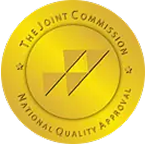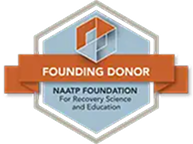Why Residential Treatment and the 12 Steps Work Better Together

When it comes to your recovery, you may wonder, “Can I do AA instead of residential treatment? Why pay for treatment, if you can just attend meetings?” There’s a lot of internal and external pressure to handle our problems ourselves, to follow some self-help guidelines, DIY-it, and push through. To save a couple dollars and some time by showing up to a few meetings, getting ourselves sober, and moving on with our lives. But if recovery was that simple, wouldn’t we have done it already?
If we could recover through willpower and the 12 Steps alone, addiction wouldn’t be the serious concern that it is. But the truth is, addiction is more than anyone can handle alone. It’s a disease, and it’s one often complicated by our mental health, physical health, and personal lives and experiences. If we had the skills and resources to manage it and our mental health by ourselves, we’d be doing so.
The 12 Steps are a truly valuable tool for recovery, but they aren’t enough on their own. Incorporating them into residential treatment, and then using what you learn in treatment to continue on with the 12 Steps after, makes both of these resources more effective and better for your immediate and long-term recovery.
Why Residential Treatment Is Needed
12-Step residential treatment is so much more valuable to your recovery than the 12 Steps alone. As the National Institute on Drug Abuse explains, “12-step programs, like Alcoholic Anonymous, are not medical treatments, but provide social and complementary support to those treatments.” Self-help cannot give you a solid, supported start and leaves you with gaps in your mental health. The 12 Steps cannot provide all-day structure, time away to reset, intensive therapy, or crisis management. On the other hand, residential treatment can. It offers the following, and more:
- A safe environment away from triggers and stressors
- Physical detox and mental health stabilization, if needed, and medical supervision and check-ins for everyone
- Medical supervision to ensure your health and safety
- Access to multiple treatment modalities like individual therapy, group support, experiential therapy, and medical support
- Daily routine and structure
- Professional, interpersonal, and personal accountability
- Peer community immersion
- An opportunity to address co-occurring disorders, trauma, and health issues
Because residential treatment with a 12-Step model offers all of this, the benefits of residential treatment vs self-help meetings are greater.
But what about combining the 12 Steps and outpatient treatment instead of residential care? You can still gain many of the benefits of treatment this way, but the long-term effects may not be the same. Residential treatment outcomes with 12-Step support are typically better, as the National Library of Medicine reveals:
Inpatients consumed significantly less alcohol in the year after entering treatment than outpatients…and had significantly greater engagement with the Alcoholics Anonymous program than outpatients in the year after treatment.
Depending on your specific recovery needs, outpatient services may work best as a step-down or transition between inpatient care and regular daily life rather than a first-line approach. But of course, talk with a reputable treatment program like Fellowship Hall to learn more about your options and to get an assessment that will help you determine what path is best for your individual recovery needs and life situation.
What the 12 Steps Add and Why They Shine in Recovery Settings
Now that you know what residential treatment adds to the 12 Steps, let’s look at why we should be integrating the 12 Steps into inpatient treatment in turn. Many addiction treatment programs follow a 12 Step structure because it works. This synergy provides great results, as Social Work in Public Health shares:
Beginning 12-Step participation while in treatment, especially at group meetings held at the treatment program, and 12-Step attendance at the same time that one is enrolled in specialty treatment, are associated with better outcomes.
The 12 Steps improve your likelihood of finding and maintaining sobriety. Treatment will help you learn how to make them a part of your recovery from day one.
And the 12 Steps truly shine when it comes to supporting long-term sobriety. They offer a roadmap you can follow long after you leave the daily guidance of a treatment program. They help you find meaning, value, and personal and social tools that will anchor your long-term recovery. Social Work continues:
Increased involvement in 12-Step meetings and activities following formal treatment may serve as an important source of support and a form of continuing care that has been shown to lead to decreased utilization of mental health and substance abuse treatment services and associated costs.
The 12 Steps keep you connected and engaged in aftercare. They provide structure and accountability long after inpatient treatment ends. Attending meetings and related activities keeps you on a schedule. It encourages social engagement and offers opportunities for personal connection and community check-ins. And the 12 Steps encourage acts of service so that you can give back to your community and strengthen your recovery in the process. This is why you want to look for 12-Step facilitation in residential care.
Do I Have to Combine Residential Treatment and the 12 Steps?
What if you don’t connect with the 12 Steps? Do you have to include them in your recovery? The simple answer is, no. No aspect of treatment is ever required or coerced. And no aspect of treatment works for everyone. Treatment should always be tailored to your specific needs and include the modalities that work best for you.
That said, the longer answer is, give it an open, honest try. While in treatment at Fellowship Hall, guests are expected and encouraged to participate in 12-Step meetings, either AA or NA. As mentioned above, there are real, proven benefits to including the 12 Steps in your recovery.
If you have doubts, consider your objections to the program. Have you tried AA without success in the past? If you didn’t choose residential treatment first, treatment that introduced the Steps and Traditions and explained how to use them, you may not have been able to make the most of the 12-Steps. Don’t let past failures limit future attempts. Addiction recovery is a process of constantly learning, growing, and trying.
Other stumbling blocks to 12-Step programs are often rooted in rejection of or confusion about the spiritual or religious elements of the 12 Steps. Keep in mind that the 12 Steps take a broad interpretation of a “higher power.” You can define this power in any way that makes sense to you and your recovery. A higher power can be a concept of God as defined by the major religions of the world, it can be a personal take on this deity, or you can see your higher power as nature, the world around you, your recovery community, or any definition that works for you and gives your journey depth, direction, and meaning.
Fellowship Hall’s Integrated Model: How We Blend the 12 Steps and Residential Care
Our residential treatment program provides the foundation. The 12 Steps can be the bridge from here to lifelong recovery, offering continuity, progress, growth, and hope. The 12 Steps are the answer to the question, “What happens after I leave residential care?” They make sure you are supported, have a community, and have a lifeline in times of stress and need, although we also offer comprehensive continuing care. We welcome alumni to reach back out to us at any time in their recovery journey and truly care about the long-term health and wellness of our guests.
Incorporating the 12 Steps from day one ensures you have a smooth transition from treatment back to daily life, with guide rails, structure, and social support already in practice and in place. This ensures a seamless handoff from one phase of recovery to the next. So even if you choose a different path than ours, make sure you look for comprehensive recovery options that blend the 12-Steps with clinically proven therapies.
Fellowship Hall integrates the 12-Steps into our residential care, step-down outpatient services, and follow-up care. Many of our staff have worked the steps and all our therapists are well-versed in the philosophy and functionality of the steps. We make sure you understand how the 12 Steps support your recovery, how you can incorporate them into residential care, and how they can support your recovery long after our residential program ends. Reach out today, and learn more about the 12 Steps and our residential programming and alumni services.
"*" indicates required fields
CONNECT WITH US
Our Admissions Staff Is Here to Help
Not sure if you or someone you love needs help? Call our Admissions Staff who can help you assess the next step at 336-553-6596."*" indicates required fields






